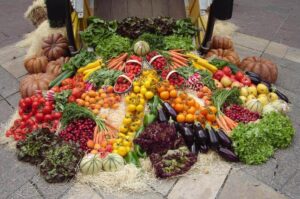You want to eat healthier, but between all of the organic produce and sprouted bread and fancy granola bars, it just doesn’t seem to be financially possible. Ditch that excuse! Healthy eating is doable in budgets of any size, if you keep a few of the tips below in mind.
Avoid Convenience Foods
They’re good in a pinch, but the prepackaged health foods come with a significant price tag. A good rule of thumb is to stay out of the aisles of the grocery store. The perimeters are where you’ll find the produce, bakery, meat counter, and dairy coolers. Other than perhaps a quick dip into an aisle for raw honey or baking flours, the perimeter of the grocery store will provide you with all the ingredients you need to make your own healthy foods. Ingredients are cheaper than premade items, you’ll learn new kitchen skills, and you’ll be helping the environment by reducing packaging waste!
Change How You Shop
Grocery stores can’t carry everything. You’ll find a higher selection of healthy items at a discounted cost using one of the many different food delivery services. Some services, such as Thrive Market, offer a wide variety of healthy or allergen-friendly foods for a fraction of the price. Others, such as Imperfect Foods, offer produce that is delicious and nutritious but slightly misshapen or discolored and would otherwise be thrown out. Some utilize truck deliveries to centralized pick-up points, others deliver directly to your door. Read reviews before you purchase, like this Imperfect Foods review for example. While most of these food delivery services operate on some sort of subscription fee, the savings from discounted items more than cover that cost.
Buy Local
There are costs involved with transporting foods, and those costs are often passed on to the consumer. You can cut out those costs by buying directly from the farmers themselves – and often find food raised more sustainably as an added benefit. Check out farmers markets for your produce. The farmers at those markets can also often hook you up with someone to source your dairy or eggs from. Buying meat directly from a farmer will require a different way of looking at your budget, as you will typically buy a portion of an animal in bulk, but spread that number over the months that meat will last, and you’ll see the difference.
Stop Throwing Food Away
So much food is wasted by simply throwing it into the trash can. Every bit of food you throw away is the same as throwing away money. Think outside the box! Vegetable scraps and leftover meat bones can be simmered into a bone stock. Berries that are going soft can be frozen and used later for smoothies and oatmeal. Nearly any combination of leftovers can be reworked into a soup. Save your bacon fat to cook with later. Hard boil eggs that are heading past their peak freshness. Turn stale bread into croutons.
Buy Frozen
Regular fresh produce is wonderful and healthy, but can be expensive when outside of the typical growing season. The difference in price between a carton of berries in the summer and in the winter is astounding! Fresh produce also needs to be picked before being fully ripe, to allow time for transportation to the grocery store. Frozen fruits and vegetables, on the other hand, are harvested at the peak of ripeness, then frozen and shipped. They last longer than fresh, are usually riper and more nutrient-dense than fresh – and are much less expensive! Buy fresh produce when it’s in season, but when it’s not – head to the freezers.

